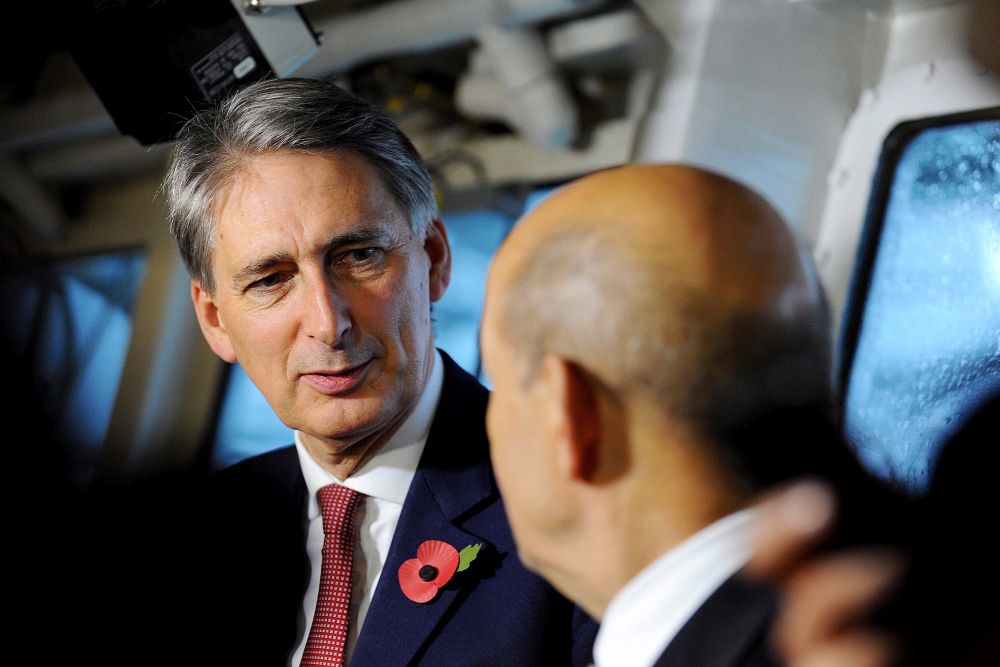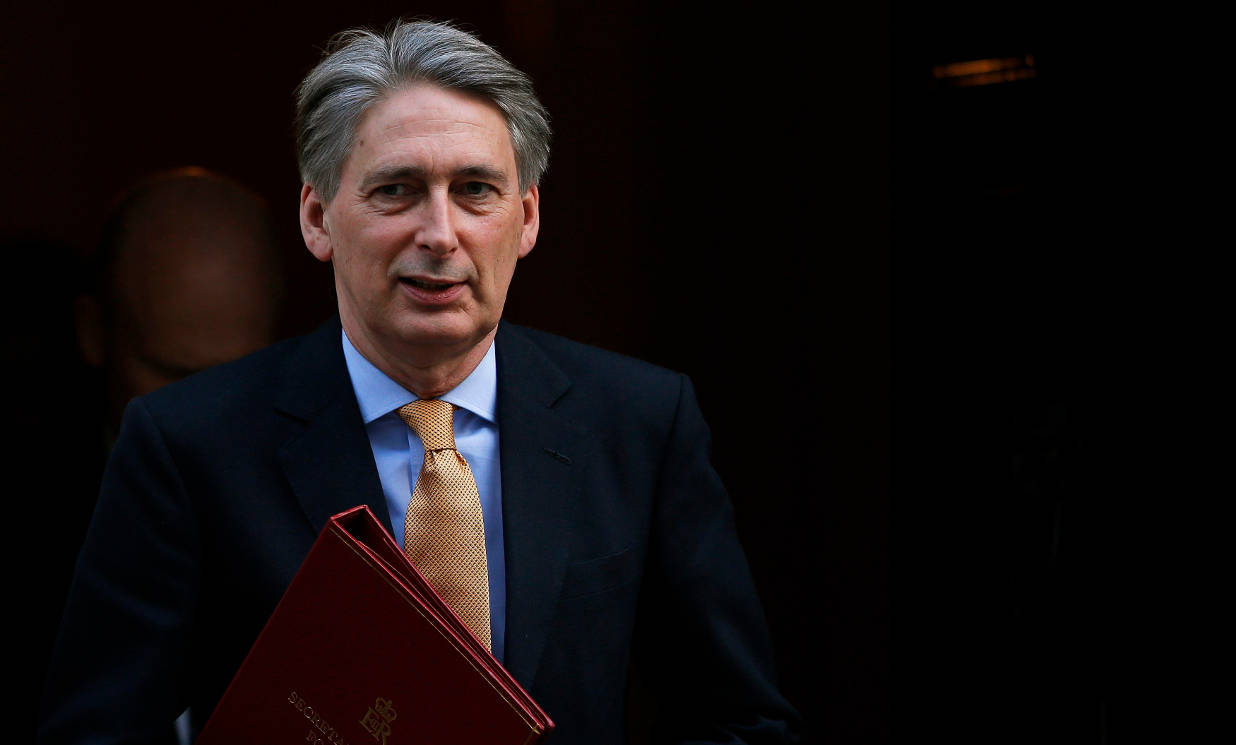
The chancellor Philip Hammond has delivered his maiden autumn statement today against a backdrop of weaker growth prospects and a large deficit.
It has been seen as the UK government's first opportunity to outline its priorities for taxes and spending in the wake of the Brexit vote. Mr Hammond has previously warned of "turbulence" and "an unprecedented level of uncertainty" as the UK leaves the EU. Growth is forecast to be 2.1% this year, and 1.4% in 2017. That is due to lower investment and weaker demand, and those are caused by greater uncertainty and higher inflation.
"That is lower than we would like," he said, "but still higher than many of our European neighbours".
The Chancellor has pledged to ban upfront fees imposed by lettings agents in England, £1.4bn aimed at delivering 40,000 new affordable homes in England, a rural rate relief increase which will give tax breaks worth up to £2900 a year and an increase of the National Living Wage to £7.50 an hour from April 2017.
The horticultural sector has previously warned of the damaging aspects a rise in the National Living Wage could be, putting the future of British fruit farmers at risk and threatening to wipe out 58% of growers' profits.
A 'National Productivity Investment Fund', worth £23bn, has been announced. Mr Hammond said the UK lags the US and Germany by 30 points in productivity, which means it takes a German worker four days to make what a British worker makes in five. Consequently, this means longer hours and lower pay for British workers.
Mr Hammond wants to double UK Export’s financial capacity. He will take a step towards the problem of UK start-ups being snapped up by larger competitors by investing £400m, with a view to unlocking £1bn of investment.
And it's good news for small and medium sized businesses in rural areas, as Mr Hammond announced a rural rate relief increase, giving tax breaks worth up to £2900 a year.
Getting the countryside on the world wide web
Mr Hammond announced a £1bn investment fund for fast broadband and mobile phone connectivity. The UK needs world-class digital infrastructure, Mr Hammond explained. The pledge means at least two million more homes and businesses will get access to full-fibre broadband services, which offers download speeds of 1Gbps. Farmers and rural businesses have been coping with less than adequate internet speeds for years.
Other changes which have already been announced prior to the Autumn Statement include investing an extra £2bn a year in science by 2021, which will influence and progress agricultural science research.

The Chancellor has assured departmental spending limits will remain in place, such as the Department for Environment, Food & Rural Affairs, which is the government mouthpiece for rural issues.
The Chancellor has already guaranteed billions of pounds of UK government investment after Brexit for projects currently funded by the EU, including agricultural subsidies.
'Overwhelming' bias to cities
Rural organisation CLA, which represents 32,000 landowners, farmers and rural businesses across England and Wales, has responded to the Chancellor's announcements.
CLA President Ross Murray said: “It is hard to see from this Statement how rural business fits in to the Chancellors’ vision for Britain’s economic future. The investments announced today are overwhelmingly targeted at improving facilities within, and connections between, our cities. We understand why this is important but it must not be done at the expense of opportunities to support the rural economy and build the homes we need to sustain our rural communities.
“Rural areas must receive the right proportionate share of spending. The Chancellor’s road and rail plans must not lead to economic opportunity hurtling past rural areas. We understand why urban projects will receive more funding, but there is little reassurance that there is a strategy to ensure a balance in investment across the country and between rural and urban areas.
“We will continue to make the case for the delivery of an economic vision that delivers increased productivity in the rural economy and build the homes that will sustain the lives of hundreds of thousands of people who live in our countryside.”
Rural insurer NFU Mutual says as low commodity prices across all sectors continue to make it difficult for farmers to make ends meet, measures to help struggling farm businesses need to be put in place.
"Measures to help their businesses through these times would help boost the rural economy and help young people get into agriculture," Tim Price, NFU Mutual rural affairs specialist.
Mr Price also made a plea for the Chancellor to consider the effects for the countryside of any measures designed to curb the use of diesel-powered vehicles.
"While diesels are being blamed for pollution in city centres, calls for extra tax on these vehicles or a rise in duty on diesel fuel could unfairly hit country people who use diesel powered 4 x 4s and pickup trucks to farm and keep the rural economy going," added Mr Price.
'Much needed boost to rural businesses'
Tim Jones, Head of Rural at property consultancy Carter Jonas, said the company welcomes the Chancellor's attention to the rural economy, in particular doubling the rural rate relief to 100 percent by 1 April 2017.
“The rate will provide a much needed boost to rural businesses, removing the inconsistency between rural rate relief and small business rate relief, which is critical in maintaining our country’s food supply, landscape and wildlife.
“We would, however, like to see the Government take this one step further and work collaboratively with the rural industry on the best long-term workable solutions for the sector through favourable policy initiatives, subsidies and support to maintain a vibrant rural economy.
“Infrastructure plays an insurmountable role in the rural economy’s success. This is not just about transport networks, but connecting people, communities and businesses to enable the construction of much needed homes, energy grids and inward business investment.
“The shift by the Chancellor to place an equal weight on local infrastructure projects to that of large-scale national ones with the allocation of £1.8 billion through the Local Growth Fund, will equal the playing field between local infrastructure projects and large-scale national initiatives, bringing the decentralisation agenda to life by connecting and improving UK regions up and down the country where investment is long overdue.”
'Fell short of delivering full potential'
The National Farmers Union (NFU) said there are 'some positives' from today's announcements, but disappointed they 'fell short' of delivering measures that will enable farm businesses to maximise their potential.
NFU director of policy Andrew Clark said: “The Chancellor’s planned reduction to the rate of Corporation Tax, while providing benefits to the supply chain, does little to help the majority of farm businesses that are unincorporated. Farm businesses need to be able to retain and invest profits in infrastructure and equipment to improve their productivity and the tax system needs to recognise and support this, as it does other parts of the economy.
“The NFU strongly supports a living wage for all workers but we have expressed to Government our concerns about the speed of the implementation. Accelerating increases will make this even more difficult for employers and we remain concerned about the lack of consultation with the agricultural and horticultural sector on these measures and how they will affect farm businesses.
“Although the Chancellor has announced a new National Productivity Investment Fund that will add £23 billion in higher value investment over the next five years, it is not clear where this will be spent. The Government must continue its support of the Agri-Tech Strategy and this new investment simply must include the agri-food sector.
“British farming will need a strong and functioning research and development pipeline to deliver solutions to both increase productivity and deliver environmental goods. To achieve this ambition to be at the cutting edge of science and technology, the whole country must be digitally connected and be able to utilise technology.
“We note the announcement of £700 million into full-fibre connections and 5G. We are eager to see what this will deliver for the remaining 5% unable to access adequate digital infrastructure at the moment – many of whom are in rural areas,” Mr Clark concluded.
